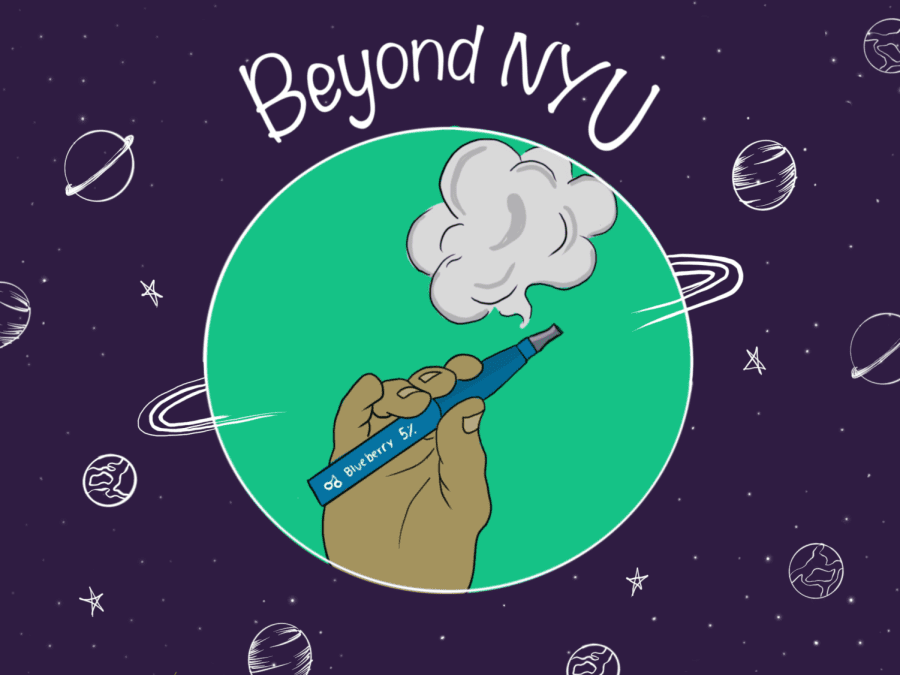Beyond NYU: Quitting vaping with judgment-free Jones
Each week, WSN sits down with an NYU student, faculty member or alum who’s making change beyond NYU. Stern MBA student Caroline Huber shares how the startup she founded with her childhood friend helps people quit vaping in a judgment-free environment.
Jones seeks to help users quit vaping in a judgement-free environment. (Illustration by Aaliya Luthra)
September 23, 2022
Stern MBA student Caroline Huber and her childhood friend Hilary Dubin are on a mission to create the new Nicorette — a nicotine replacement chewing gum that was developed in the 1970s and hasn’t changed in appearance or formula much since. With Jones, a startup that seeks to help people quit vaping in a non-judgmental environment, the two are modernizing the concept of nicotine replacement therapy.
Huber and Dubin started Juuling in 2017, and their addictions quickly spiraled out of control. They only made progress in quitting after discovering nicotine lozenges, a form of nicotine replacement therapy recommended by Huber’s doctor, but the stigma associated with the product was not promising as a long-term solution.
In an interview with WSN, Huber shared more about how Jones — which won NYU’s ninth annual NYU-Yale Summer Accelerator Pitchoff in July — will create a pathway to quitting vaping with rejuvenated nicotine replacement therapy products and an app that will address the psychological aspects of addiction.
This interview has been edited for length and clarity.
WSN: What is the main goal of Jones?
Huber: We want people to think of us as the place to go when they are looking to quit or to embark on a healthier lifestyle, and a place where they can do so without feeling any judgment from the company and without feeling the stigma associated with a lot of the other products on the market. We want people to feel like we’re in this together. The reason we’re doing this is because we’ve also struggled so much on this journey to get off of smoking and vaping. The idea that it has to be something that you are embarrassed by and don’t want to talk about publicly is just really out of touch with where we are now. You should feel proud that you’re making a healthier choice, not embarrassed by it.
WSN: How did vaping influence your life before you stopped? Why do you think more people should decide to quit?
Huber: It totally took a toll on my mental health. It made me feel way more anxious than I normally felt. It made exercising much harder than it typically was. Being able to quit has just helped me so much, and I think that long term, there will be a lot of health benefits that I’ll glean as a result just because we don’t know what’s in these things.
Tobacco, for years and years, was not seen as something that was negative for anyone’s health, and it took a long time for studies to catch up. I think we’re going to see something very similar in terms of research on the longitudinal effects of vaping on your health. Anecdotally, we’ve seen how bad it is for you and short-term study suggests that it’s bad for your heart health, lung health and mental health. The implications are pretty wide-ranging, and giving people the opportunity to quit — if that’s what they want — will be really beneficial to people’s health and it’ll help people save money.
Although research suggests that vaping nicotine is safer than smoking cigarettes, studies have shown its negative health impacts, which include heightened blood pressure, cardiovascular disease, chronic lung disease and asthma. Current research is only short term, as many vapes were developed very recently; for example, Juul was founded in 2015. Therefore, the long-term impacts of vaping are largely unknown.
Huber said that rather than make participants feel as if they need to quit vaping altogether, the purpose of Jones is for people to set their own benchmarks on the path to tackling addiction.
She added that even though quitting vaping altogether is ideal, vaping less can also be beneficial to users’ health, and Jones seeks to avoid an all-or-nothing approach to quitting. Just as she and Dubin followed different journeys to meet their goal of quitting, each Jones user will be able to determine what boundaries they want to set for their vaping habits.
WSN: Why is maintaining a judgment-free environment such an important part of Jones’ mission, and how is the company trying to destigmatize the process of quitting?
Huber: If your journey looks different than what you think other people talk about in terms of quitting, that’s something that we really want to destigmatize. If quitting for you is just “I only vape on the weekends,” then that’s great. If we’re able to help you get off of it most of the time, and that’s what you’re looking for, that’s absolutely an option. We just need to have less black-and-white conversations around addiction and understand that it’s a more nuanced struggle than just either you’re smoking or you’re not smoking.
Destigmatizing nicotine as a substance is something we’re looking to do because it really is this superheating of plastics and the chemical components in vaping that are the dangerous things. Nicotine itself has been studied for a long time and has a lot less negative health effects than a lot of the other things that are in vape. Providing a safer outlet for people to take the drug, if that’s what they want to continue doing, also will help people long term in terms of their health.
While nicotine lozenges eventually did help Huber and Dubin quit vaping, the uninteresting packaging and marketing of the product deterred the two young women. Vaping is most prevalent among young people, but the products meant to address nicotine addiction that are currently on the market do not cater to young adults or their tastes, Huber said.
Nicorette, which comes in packaging resembling that of other over-the-counter medications, first hit the shelves in 1984. Huber said that Jones wants to disrupt the bland nicotine replacement therapy norm.
WSN: What are the problems with the products that are currently on the market to help people quit smoking and vaping, and what is Jones doing to address those problems?
Huber: The products are pretty low awareness in terms of their ability to help people who are looking to quit vaping. For people who smoke, there’s generally an awareness that there are products available like nicotine gum to help you quit. I don’t think that there’s that same understanding in terms of vaping.
The other thing is the way that they’re branded and marketed — it feels really tone deaf to the generation of us who are hooked on Juuling and want to quit. The products were made in the 1970s and they have not really been updated since, so it feels like it’s not necessarily the right product to be addressing the issue. There’s low confidence that it’s going to be helpful, just because look and feel-wise, it doesn’t feel like the right thing.
WSN: What is Jones doing to address the social and psychological aspects of addiction?
Beyond that, we’re doing a digital product that’s going to help people with their habit formation. A lot of the problem is that right now, the existing products in this space are very focused on the biochemical replacement of nicotine, but that doesn’t necessarily address any of the habits people have around nicotine and the underlying reasons why people would rely on nicotine. We’re really looking to do this in a more holistic way that addresses both the biochemical need and the underlying psychiatric and psychological needs that people have as it relates to an addiction.
WSN: How does Jones address the psychology behind addiction? Has that been done in this way before?
Huber: It’s something entirely new. We’re working with addiction experts and psychiatrists to come up with an app that’s really based on psychological needs around addiction based on the principles of accountability, positive psychology and positive reinforcement. We’re also bringing in a social component so that you can feel like you’re supported throughout this, and also you can tap into your larger network if quitting with friends is something that’s appealing. We’ve heard from a lot of our customers that the idea of quitting on your own feels really daunting because part of what keeps the addiction going is the fact that so many people’s friends also smoke. It’s really hard to feel that social isolation when you’re out and you’re not participating, so we really think that getting groups to do this together and do this process alongside one another will be really beneficial.
The startup is currently finishing its first round of funding, and Huber said that support for the company has been overwhelming. A beta version of Jones’ digital app will officially launch in January, and the physical product will follow soon after.
In the meantime, individuals who are interested in quitting or scaling back their vaping habits can visit Jones’ website, where they can fill out a questionnaire about their habits, goals and preferences. The company will then provide users with a custom quitting program.
If you know an NYU student, faculty member or alum who’s making change beyond NYU, contact [email protected].
Contact Abby Wilson at [email protected].




























































































































































